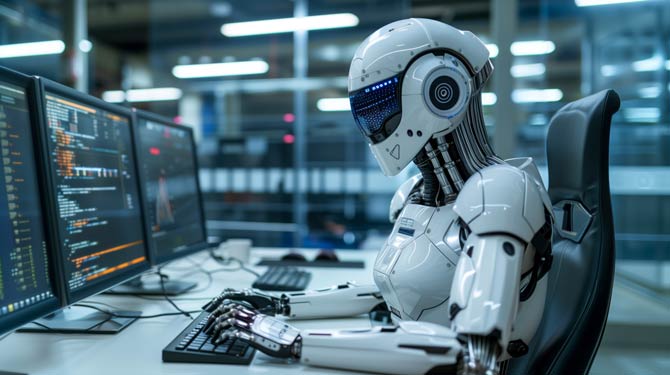AI as a job killer Time and again, frightening statements circulate in the media that offer little hope for a professional future as a programmer. Claims such as “AI will make most programming jobs redundant” or “in five years there will be no more programmers” cause many working people to worry. The trigger for this development is the triumph of ChatGPT.
Exponential increase in AI capabilities
There are numerous options for using the successful tool. One possibility is to develop codes, as the AI applications master scripting and programming languages such as PHP, Python, JavaScript or SQL, among others. So far, the codes generated by the AI tools are often still faulty or unsafe.
However, there is a high probability that consistent further development of machine learning will automatically improve the programming capabilities of the AI tool.
It can even be assumed that the skills of AI developers will increase exponentially. It is therefore understandable that more and more software developers fear for their professional future in this segment. In addition, the doubts of young professionals about even wanting to learn the job of programmer are justified.

Do programmers have to fear losing their jobs?
There is no clear answer to this question yet. Nevertheless, the developments leave room for speculation. Even if AI tools such as ChatGPT, AlphaCode, Tabnine or Google Bard are becoming increasingly powerful, applications may not be able to meet complex challenges in the future.
It is possible that in the future the tools will only be able to support programmers or provide simple solutions. It is therefore not impossible that in the future there will still be a need for experienced programmers who can expertly examine codes and test results in detail.

From software developer to project manager?
This development could lead to software developers programming less and less themselves and instead taking on the role of project manager or QA manager. This change would definitely have a positive side. There is already a massive shortage of skilled workers in the IT sector. Freelance developers in particular are in demand everywhere. At the moment, it is not expected that the situation will ease in the future.
On the contrary: Due to advancing digitalization, more and more experts will be in demand in the future.
AI tools could therefore counteract the shortage of skilled workers. Companies could benefit from ChatGPT by using it to program simple applications. Alternatively, it would also be conceivable that programmers could focus on projects in the future that require a lively exchange between several employees. This option would facilitate cooperation between contractors, clients and end customers.
Other future perspectives
But another future perspective is also conceivable. In this scenario, artificial intelligence would be able to master almost all common programming languages. The codes would be so sophisticated that developers might actually be superfluous. Then it is also not impossible that the AI programs could work even more effectively than humans.
However, this does not necessarily mean that programmers are facing a bleak future. For example, programmers could see their professional future in the creation of software architecture or the planning of programs. It cannot be ruled out that AI tools will only work to a limited extent with unpopular programming languages such as ABAP or Fortran. This development could open up new perspectives for experienced software developers. Alternatively, programmers could also devote more attention to so-called prompting in the future.
So far, AI tools have only been able to respond to user input to a limited extent. In order for applications and codes to correspond to our ideas, the programs need the right instructions. The quality of these results is based, among other things, on so-called prompts or briefings.

Learning to program—also for the future?
Some trends suggest that it could be worthwhile to learn this profession in the future. After all, there are numerous companies operating at national and international level whose need for digital solutions is extremely high.
To meet the demand, it would even be desirable for AI tools to take over the coding tasks.
Alternatively, the programs could provide important assistance and thus accelerate software development.
Adapted Jobs
Although it is difficult to make reliable predictions about the future, there is still a risk that artificial intelligence could displace programmers over time.
However, it seems more realistic that many developer jobs will change over the next few years. In the future, programmers will probably be forced to learn how to integrate AI applications into their everyday work. It is currently assumed that programmers will have to deal more with planning, project management, quality assurance or prompting in the future.
AI as a job killer
AI as a job killer
AI as a job killer
AI as a job killer
AI as a job killer
AI as a job killer
AI as a job killer
